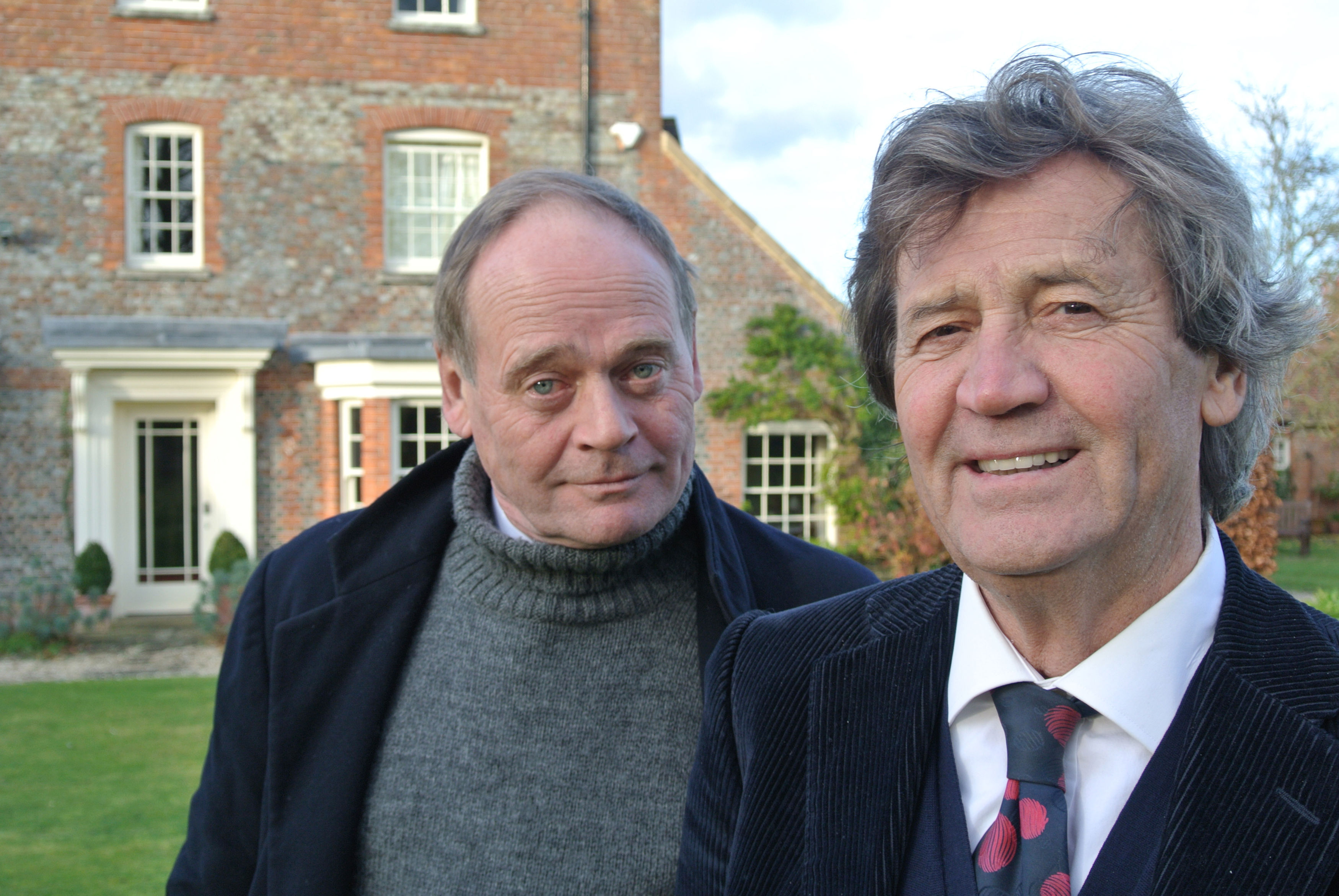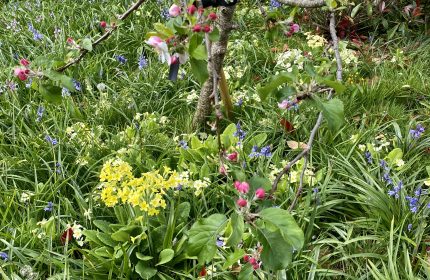Melvyn Braggs about South Bank return
As the a new series of long-running culture programme The South Bank Show returns, Melvyn Bragg talks to Susan Griffin about life, death and his one great love – the arts
Melvyn Bragg’s ability to reduce interviewees (and interviewers for that matter) to quivering wrecks has earned him a fearsome reputation, but in person, he’s far from glowering.
In fact, with a few hours to go before he hosts an event to launch the new series of The South Bank Show, the 74-year-old even admits he’s feeling nervous.
“It’s quite nerve-racking [thinking about] talking live tonight,” he says in a softly-spoken voice. “Partly because I can’t read my own bloomin’ handwriting. I mean look at this, I’ve scrolled this speech,” he adds, chuckling as he points out his admittedly messy notes.
Bragg laughs often, not least on acknowledging that some of those taking part in recent series weren’t born when it launched back in 1978.
“When we started I had a manifesto, I didn’t like the idea of a pyramid in the arts, that opera was top and pop music was bottom. I thought a better way to look at it is as a rainbow,” he says. “All the colours are there, they’re all going in the same direction and it’s quality not category.”
For the next 31 years, The South Bank Show broadcast profiles on the world’s most renowned artists, actors, writers and musicians – and then in 2009, ITV axed it.
Bragg was “baffled” by the decision but, though cautious when Sky Arts first expressed an interest in reviving it, eventually signed on for a six-part series with the channel, which aired in 2012.
It proved as contemporaneous as ever, covering everything from Tamara Rojo in her first months as Artistic Director of the English National Ballet to comedian and Matilda The Musical composer and lyricist Tim Minchin, violinist Nicola Benedetti and tenor Alfie Boe.
Bragg, who presents, edits and writes the series, also immersed himself in the world of Grime music with Dizzee Rascal and Wiley.
“That sort of music was brought to me by one of my best producers, Archie Powell, who said, ‘You’ve got to listen to this, it’s new and interesting’,” he recalls. “The show was very hard to make because they’re very elusive. Making appointments with those guys doesn’t mean very much!”
His interview success is down to research, he believes. “You do your homework so they can relax. They know you’ve read the books, listened to the songs, watched the films. That’s the first thing,” he says. “Then you work out an intelligent line when you’re asking questions… And then you need a bit of luck!”
While he’s been accused of not being critical enough on occasion, he simply argues “that’s because most of the people I do, I admire”.
The line-up for this series is as diverse as ever and will feature TV producer John Lloyd, actor Daniel Radcliffe, singer Angel Blue, author Kate Atkinson, playwright Abi Morgan and a special episode on King Lear, with contributions from the National Theatre’s most recent Lear, actor Simon Russell Beale and director Sam Mendes.
“This is as good as it’s going to get,” says Bragg. “I mean, we’re doing Lear, what many people believe to be the greatest play Shakespeare, therefore anybody, wrote.
“John Lloyd [who’s worked on shows such as Spitting Image and Blackadder] is arguably the best producer from the last 30 years, and Abi Morgan [The Iron Lady and The Hour] is a prolific young writer.”
And then there’s Radcliffe, “the most famous boy actor since Mickey Rooney”.
“Probably the most famous ever,” Bragg adds, “who’s turned himself into a major stage actor. God knows how he did it, because no one else has managed it.”
The son of a seamstress and stock keeper, Bragg describes his early life in Carlisle as financially poor, and acknowledges that’s probably been a contributing factor in wanting to combine traditional ‘high art’ with popular culture in his shows.
“It’s not about making it accessible, it’s making it available,” he explains. “Once you try and make it accessible, you’re finished. You can talk about the existential meaning of Lear’s speeches, without dumbing it down. And once you’ve made it clear and available, which is what television does, then you’ve done your job. So it’s partly an evangelical streak, I think.”
Bragg read Modern History at Oxford and in 1961, began a career at the BBC, spending time in radio before joining the production team of the art series Monitor. In the mid-Seventies, he presented the programmes Read All About It and The Lively Arts, before beginning work on The South Bank Show. He’s continued to combine TV and radio, notably on BBC Radio 4, where he continues to present the discussion programme In Our Time.
He also finds time to write and has written “about 20 novels in 50 odd years”.
“I didn’t want to do anything else except write, which I started to do before television,” he explains.
He believes he might have been a lecturer in an alternate life (“I wasn’t patient enough to be a scholar”).
“I don’t have any time-consuming hobbies, I don’t fish, don’t play golf and never will,” he says. However, writing is a pastime, as well as a job, and he keeps a notepad on his bedside table ready for any early hour moments of inspiration. “A lot is illegible the next morning, but I have a philosophical notion that if it’s any good, it will come back [to me].”

Arts broadcaster Melvyn Bragg and his wife Catherine arriving at St James’s Church in London’s Piccadilly for the memorial service for TV star Russell Harty.
When he and second wife Catherine aren’t in London, they’re enjoying the peace and quiet of their cottage in Cumbria, which they’ve owned for around 40 years.
Although there was a family vacation to the south of France last year, Bragg doesn’t relish holidays anymore. “It’s to do with age,” he says, smiling. “When I was young, I liked to go on holiday to cheap and cheerful beaches where you’d swim a lot, drink a lot and eat a lot. Then you get older and think, ‘Well, that’s nice but there are other things [to be doing]’.”
He might be in his eighth decade but he’s looking good, and that hair’s as thick as ever. He tries to take good care of himself although tends “not to run for a bus”.
“74, it’s very strange,” muses Bragg, who’s suffered a couple of nervous breakdowns in his life. “When you’ve had a breakdown there’s always a streak of nervousness in you that keeps coming back,” he says. “It’s like a little pulse and you never know when it’s going to strike again.”
As he grows older, he admits he fears suffering from dementia, as his mother did for the last five years of her life. “I was pleased my mother didn’t seem to be in distress, but I think I would be in distress if I couldn’t think,” he says.
He also finds himself pondering the finality of death. “You do as you get older. And then sometimes you think beyond that and think there will be nothing, just nothing; how can you imagine just nothing?”
Shaking off an invisible cloak of morose, Bragg smiles and adds: “So you just get on with your life, and I’ve had a good innings.”
Latest posts by Sally - Silversurfer's Editor (see all)
- Would you like to take a flight into space? - April 14, 2025
- Brunch muffins with poached eggs, asparagus tips and smoked bacon - April 14, 2025
- What’s the best part of Easter the Weekend? - April 14, 2025
- The Boom Radio All Time Chart - April 11, 2025
- Discover Oregon: Your Ultimate Adventure Awaits with Non-Stop Flights from London Heathrow - April 11, 2025





















